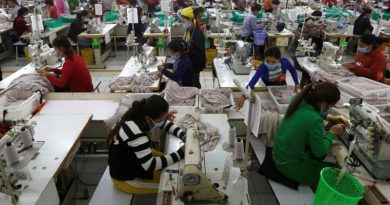Lao Employment Law During The COVID-19 Pandemic
by Mekong Legal, Lao PDR Labour Law and Employment Specialists
For now, it appears that Laos has succeeded in curtailing the spread of COVID-19, recently marking 50 continuous days without a reported new case of the coronavirus within its borders. This comes on the back of strict nationwide lock-down measures imposed upon Lao society and businesses, which have been cautiously eased and updated since measures were first introduced by the Prime Minister’s Office in late March this year.
As we emerge from the lock-down, adverse impacts and uncertainty of the pandemic are becoming increasingly realised as many businesses and organisations are faced with financial hardship and unprecedented operational hurdles. Employers and employees alike contemplate their future work prospects and the implications of living and working under a “new normal”.
This article by Mekong Legal addresses the human resources challenges facing employers in Laos and answers the challenging questions relating to the workplace within Laos’ labour law framework and COVID-19-specific regulations and guidance, including those recently issued by the Prime Minister’s Office and the Ministry of Foreign Affairs respectively, effective as of 2 June 2020.
1. Where do the COVID-19-specific regulations currently stand in Laos?
A lot has happened since the creation of the National Taskforce Committee for COVID-19 Prevention and Control (“National Taskforce”) in early February this year and the first major precautionary measures were introduced by the Prime Minister’s Office on 29 March 2020.[1] Amongst these measures included a strict “stay at home” order, business and factory closure and, a domestic and international travel ban.[2]
In response to uncertainty facing employers and employees during the lockdown, the National Taskforce issued Instruction No. 31 on 21 April 2020[3] which prescribed measures to be implemented by businesses, projects and factories in order to lawfully resume operations. This Instruction was replaced and expanded upon by the more detailed National Taskforce’s Guidelines No. 71 on 11 May 2020. Measures include a socially distanced workspace, the provision of face masks and hand sanitizers to all employees, as well as recording the body temperature of every person entering or exiting the workplace.[4]
By May, as it appeared that coronavirus infection rates were low and in control in Laos, the Prime Minister’s Office issued Notice No. 580 on 15 May 2020[5] to relax some of the stricter lock-down measures, and authorised domestic travel and normal office business operations to resume in Laos. Work from home or telecommuting was still strongly encouraged when done so in compliance with guidance issued by the National Taskforce. This Notice remained in effect until 1 June 2020, following which the Prime Minister’s Office issued Notice No. 597 for the period of 2-30 June to further ease restrictions, including the resumption of certain social activities and the reopening of schools.[6]

J&C offers premium discounts on corporate medical insurance and customize health coverage for your company or group
Similar to many of the international travel restrictions globally, the Ministry of Foreign Affairs has also been active in restricting the issuance of visas to foreigners wishing to enter Laos. On 20 March 2020, the Ministry of Foreign Affairs suspended the issuance of all tourist visas and ASEAN visa exemptions, eventually expanding the suspension to include the issuance of all types of visas at its diplomatic missions abroad and visas on arrival services. [7] In the most recent update by the Ministry of Foreign Affairs in Notice No. 1444, [8] restrictions have since been cautiously eased to allow healthy individuals with valid work/stay permits intending to return to Laos to do so and undertake a 14 day quarantine upon arrival. Furthermore, with the approval of the National Taskforce and the Ministry of Foreign Affairs, companies and organisations are now permitted to resume the entry of foreign labour and/or foreign investors to Laos.
2. Our business/organisation has reopened or will open soon. What health and safety measures are required of an employer?
In the wake of COVID-19, the National Taskforce’s current Guidelines No.71 require that an employer introduce and implement workplace measures such as, among other things, providing facemasks to employees, providing sufficient space (at least 1 metre) between employees and designating an individual to conduct close monitoring of employees for symptoms associated with COVID-19. This includes arranging for temperature testing, access to handwashing/hand sanitiser stations at entrance points to a workplace, ensuring daily cleaning of all areas of the workplace and proper disposal of trash and waste.[9] These regulations apply in addition to existing provisions on operational health and safety obligations required of employers under the Labour Law,[10] the Decree on Occupation Safety and Health, [11] and the Law on Hygiene and Health Promotion.[12]
3. What happens if an employer does not comply with health and safety measures?
Employers who do not comply with health and safety measures may face penalties for breach, including fines, order for suspension of business and even legal proceedings. If the spread of COVID-19 can be traced to an employer’s violation of health and safety measures, they will be liable for any related expense that incurs within the workplace.
4. I need to temporarily re-organise my business. As an employer, can I transfer, re-task, or redeploy staff within a workplace? Will this affect salary?
The Labour Law permits an employer to “transfer” an employee to perform another task within the workplace for a maximum period of three months without change in employment conditions.[13] We understand that this provision may extend to physical redeployment, such as another office operated by a business or organisation.
If a temporary task attracts a higher salary within the workplace, a transferred employee will be entitled to the same salary of that position for the duration of the transfer. When the employee returns to their original task, the employee should continue to receive their original salary or wage before the transfer. A new employment contract or an amendment to the existing employment contact must be entered into between the employer and employee if the period of transfer lasts longer than three months. [14]
5. Our business/organisation has suspended its operations due to COVID-19. Is it possible to suspend an employee’s contract or pay while they are not working during this period?
You have probably heard of employees being “furloughed” in global news. This term refers to the suspension of an employee’s contract by an employer without pay on the premise that the employee will resume work after a specified period.
Furloughing, or suspension of an employment contract by an employer, is not recognised under the Lao labour law with the exception of two reasons: (1) if an employee is undertaking national service, and, (2) if an employee is held, detained or restricted to a certain area by the Lao authorities.[15] Depending on individual circumstances, COVID-19-related laws or regulations implementing “stay at home order” and suspension of travel within Laos[16] may meet this criteria. However, since the Prime Minister’s Office Notice No. 580 lifted restrictions on domestic movement on 18 May 2020, this provision is no longer be applicable to the current situation.
Absent either of two conditions to suspend an employee’s contract, the Labour Law provides that an employee is entitled to at least 50% of normal salary or wages owed to the employee if a workplace has been ordered by relevant local authorities to temporarily suspend production or business activities, or the employer has voluntarily suspended business operations. [17]
The Labour Law does not specify a limit to the duration of suspension nor does it address any reason which must be demonstrated by the employer. To the best of our knowledge, this has not been tested by an employer during the COVID-19 pandemic.
6. What if an employee is stuck overseas and cannot return to work in Laos? Can we agree to hit the “pause button” on the employment relationship until their return?
We understand that both employers and employees, where possible, wish to maintain their employment relationship and avoid scenarios such as termination of employment. As furloughing, or suspension of an employment contract is not a legally protected right under Lao labour law, it is only an option upon mutual agreement between an employer and employee. If such a term is not already provided for in an employment contract, it may only be added or amended upon by written agreement of both parties. An employer may also wish to consider suspending benefits (other than those legally protected under the Labour Law) during the period of agreed suspension.
7. What options do employees have if they are concerned about possible risk and exposure to infection at work? Can they take leave without pay or refuse to come to work?
There are no new regulations on leave without pay in the COVID-19 context and, as such, normal provisions of the Labour Law apply to this situation. Unless otherwise provided in an employment agreement, an employer and employee must come to a mutual agreement in writing should an employee wish to take leave without pay beyond their ordinary leave entitlements.
The situation becomes more complicated if inadequate protections from infection of COVID-19 causes an employee to refuse to come to work. If an employer is in fact in breach of health and safety measures, the employee should report the employer to the health authorities and would not be in breach of their employment contract during their period of absence from work.[18]
8. For employers struggling to keep business operations afloat, what options are available to terminate or reduce staff numbers?
Given the current downturn in trade and business, many employers may no longer see the need to maintain regular staff numbers and, consequently, will seek to terminate the employment of some of their staff members.
The Labour Law provides general language that permits an employer to terminate an employee’s employment contract should the employer consider it necessary “to reduce the number of workers in order to improve the work within the workplace”. [19] While there is no further statutory guidance on what improvements in work within the workplace means, it should reasonably apply to situations where downsizing or restructuring the workforce would be necessary to help the business during financial or operational hardship.
Prior to making an employee’s position redundant, an employer is required to first consult the relevant trade union or employee representative or the majority of employees and report the matter to the Lao Labour Authority. In the case of international organisations such as INGOs and embassies, the matter must be reported to the Ministry of Foreign Affairs instead of the Lao Labour Authority.
Employers must also provide a severance payment for terminating an employment contract due to redundancy calculated at a fixed rate of 10% of the employee’s previous month’s salary or wage, multiplied by the number of months worked. This calculation applies to both fixed-term and indefinite employment contracts.
Redundancy can only be claimed by an employer if the legal requirements described above are met. In all other conditions, normal termination provisions apply and an employer will need to comply with minimum notice periods set out in the Lao labour law (at least 45 days for employees undertaking “skilled” labour and 30 days for all other employees for indefinite contracts, and upon agreement for fixed-term contracts),[20] unless more favourable conditions have been provided in an employment contract. This is an essential point of warning to prevent an unjustified termination of employment contract which would result in compensation to the employee at a rate of 15% of the employee’s previous month’s salary or wage, multiplied by the number of months worked.
Employers should also be aware of a list of legally protected circumstances applicable to the current COVID-19 situation in which termination of employment contracts would be considered unauthorised, such as when the employee is on leave with permission, the employee is performing work in another location after being assigned by the employer or the employee is in the process of making a claim or taking legal action against the employer (including violations of health and safety measures).[21]
Conclusive remarks
As the situation develops, we are closely monitoring legislative changes in this area. We encourage employers to pay careful attention to the regularly updated regulations and guidance as issued by the Lao authorities and to ensure that they are in compliance with the same.
Should you have any questions relating to our article or would like further advice on employment matters in Laos, drop us a message to info@mekonglegal.com and we’ll be sure to promptly get back to you.
[1] Prime Minister’s Office Order No. 06/PMO on the Containment, Prevention and Full Response to the COVID-19 Pandemic dated 29 March 2020 (“PMO Order No. 06”).
[2] Prime Minister’s Office Notification No. 481/PMO on the Extension and Supplemental Guideline on the Implementation of Order No.06/PMO dated 15 April 2020.
[3] Instructions on the Conditions and Measures for Eligible Private Companies to Operate During the COVID-19 Outbreak No. 031/NTC dated 21 April 2020.
[4] Guidelines on Conditions and Measures for Businesses to Operate During the COVID-19 Outbreak No. 071/NTC dated 11 May 2020 (“Guidelines No. 71”).
[5] Prime Minister’s Office Notice No.580/PMO dated 15 May 2020 (“Notice No. 580”).
[6] Prime Minister’s Office Notice No. 597 dated 29 May 2020.
[7] MOFA Notice No. 472/AE.AC.1 dated 17 April 2020; PMO Notice No. 580 to 1 June 2020.
[8] Travel Advisory for Entry and Exit of Lao PDR During the Implementation of Measures to Prevent, Control and Respond to the COVID-19 Pandemic No. 1444/MOFA.TC dated 1 June 2020.
[9] National Taskforce Guidelines No. 71.
[10] Labour Law No.43/NA dated 24 December 2013 (“Labour Law”).
[11] Decree on Occupation Safety and Health No. 22/GOV dated 5 February 2019.
[12] Law on Hygiene and Health Promotion No.73/NA dated 22 November 2019.
[13] Article 91 of the Labour Law. Article 3 of the Labour Law refers to a workplace as a “labour unit” which includes a legally registered production, business or service unit.
[14] Article 91 of the Labour Law.
[15] Article 81 of the Labour Law.
[16] Articles 3 & 4 of the PMO Order No. 06.
[17] Article 111 of the Labour Law.
[18] Art 83(2) of the Labour Law.
[19] Article 82(b) of the Labour Law.
[20] Article 80 of the Labour Law.
[21] Article 87 of the Labour Law.





